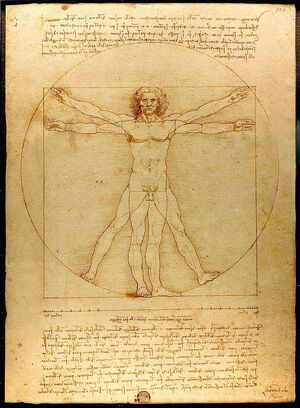(Adding categories) Tag: categoryselect |
No edit summary Tag: sourceedit |
||
| Line 1: | Line 1: | ||
| + | [[File:800px-Da_Vinci_Vitruve_Luc_Viatour.jpg|thumb|300px|Vitruvian Man]] |
||
A species of [[hominid]] descended from [[Pak]], and native to the planet [[Earth]]. |
A species of [[hominid]] descended from [[Pak]], and native to the planet [[Earth]]. |
||
Revision as of 22:44, 15 May 2017

Vitruvian Man
A species of hominid descended from Pak, and native to the planet Earth.
Physiology and Appearance
Human breeders like all other hominids have two sexes, male and female. Unlike other hominids, they often conform to strict "gender-roles" differentiating between the two culturally and psychologically.
The average male human stands approximately 1.8m tall while the female is slightly shorter at approximately 1.6m, though colonial humans have experienced many physical changes because of differences in environment of colony worlds. Although humans appear hairless with notable hair growth occurring chiefly on the top of the head, underarms and pubic area, humans have hair follicles covering their bodies. Most human hair is very short and fine, and not heavily pigmented thus making it difficult to see.
Humans are omnivorous, eating both plant life, and the flesh (usually treated with heat) of animals native to Earth. Varying with available food sources in regions of habitation, and also varying with cultural and religious norms, human groups have adopted a range of diets, from purely vegetarian to primarily carnivorous. In some cases, dietary restrictions in humans can lead to deficiency diseases; however, stable human groups have adapted to many dietary patterns through both genetic specialization and cultural conventions to use nutritionally balanced food sources. The human diet is prominently reflected in most human cultures.
The human body’s ability to adapt to different environmental stresses is remarkable, allowing humans to acclimatize to a wide variety of temperatures, humidity, and altitudes. As a result, humans are a cosmopolitan species found in almost all regions of their home-planet, including tropical rainforests, arid desert, extremely cold arctic regions, and heavily polluted cities. Most other Earth species are confined to a few geographical areas by their limited adaptability.
Human skin color can range from darkest brown to lightest pinkish-white, or even nearly white or colorless in cases of Albinism (lacking pigment). Human hair ranges in color from white to brown to red to the most commonly black.
Language
Historically, humans have spoken thousands of languages native to their home-world, though most of these are no longer in use. Interworld is the most commonly spoken human language. It was developed as a way to speed communication between humans and other species of Known Space. Originally derived from Spanglish, which itself was derived from the merging of two archaic languages; English and Spanish.
History
Humans, like their progeny are by nature war-like. Though with the advent of UN laws governing birthrights, capital punishment and the like, most reasons for intra-species war are no longer relevant.
Organized violence was virtually eliminated, being reduced to roughly 1 in 1000 people, and there was no interpersonal violence, except occasional outbursts in the asteroid belt where medical and psychological care were spread too thinly.
During the first phase of human interstellar colonization (i.e., before humanity acquired the Quantum I Hyperdrive), simple robotic probes were sent to nearby stars to assess their planets for habitation. The programming of these probes was flawed: they sent back a "good for colonization" message if they found a habitable point, rather than a habitable planet. Sleeper ships containing human colonists were sent to the indicated star systems. Too often, those colonists had to make the best of a bad situation.
The Puppeteer government concluded that humans' most notable quality was luck, and decided to improve this trait. Manipulating politics on Earth through bribery and blackmail, the Puppeteers caused the "Birthright Lottery" on Earth around 2650, biasing human genetic selection (controlled by the "Fertility Board of the United Nations") towards encouraging luck.
